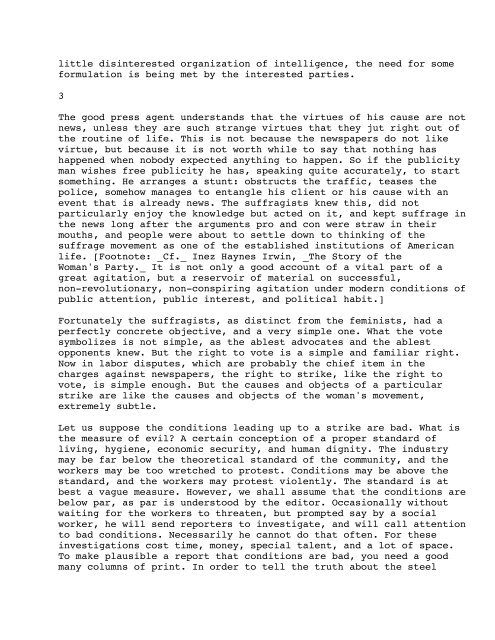PUBLIC OPINION by WALTER LIPPMANN TO FAYE LIPPMANN ...
PUBLIC OPINION by WALTER LIPPMANN TO FAYE LIPPMANN ...
PUBLIC OPINION by WALTER LIPPMANN TO FAYE LIPPMANN ...
Create successful ePaper yourself
Turn your PDF publications into a flip-book with our unique Google optimized e-Paper software.
little disinterested organization of intelligence, the need for some<br />
formulation is being met <strong>by</strong> the interested parties.<br />
3<br />
The good press agent understands that the virtues of his cause are not<br />
news, unless they are such strange virtues that they jut right out of<br />
the routine of life. This is not because the newspapers do not like<br />
virtue, but because it is not worth while to say that nothing has<br />
happened when nobody expected anything to happen. So if the publicity<br />
man wishes free publicity he has, speaking quite accurately, to start<br />
something. He arranges a stunt: obstructs the traffic, teases the<br />
police, somehow manages to entangle his client or his cause with an<br />
event that is already news. The suffragists knew this, did not<br />
particularly enjoy the knowledge but acted on it, and kept suffrage in<br />
the news long after the arguments pro and con were straw in their<br />
mouths, and people were about to settle down to thinking of the<br />
suffrage movement as one of the established institutions of American<br />
life. [Footnote: _Cf._ Inez Haynes Irwin, _The Story of the<br />
Woman's Party._ It is not only a good account of a vital part of a<br />
great agitation, but a reservoir of material on successful,<br />
non-revolutionary, non-conspiring agitation under modern conditions of<br />
public attention, public interest, and political habit.]<br />
Fortunately the suffragists, as distinct from the feminists, had a<br />
perfectly concrete objective, and a very simple one. What the vote<br />
symbolizes is not simple, as the ablest advocates and the ablest<br />
opponents knew. But the right to vote is a simple and familiar right.<br />
Now in labor disputes, which are probably the chief item in the<br />
charges against newspapers, the right to strike, like the right to<br />
vote, is simple enough. But the causes and objects of a particular<br />
strike are like the causes and objects of the woman's movement,<br />
extremely subtle.<br />
Let us suppose the conditions leading up to a strike are bad. What is<br />
the measure of evil? A certain conception of a proper standard of<br />
living, hygiene, economic security, and human dignity. The industry<br />
may be far below the theoretical standard of the community, and the<br />
workers may be too wretched to protest. Conditions may be above the<br />
standard, and the workers may protest violently. The standard is at<br />
best a vague measure. However, we shall assume that the conditions are<br />
below par, as par is understood <strong>by</strong> the editor. Occasionally without<br />
waiting for the workers to threaten, but prompted say <strong>by</strong> a social<br />
worker, he will send reporters to investigate, and will call attention<br />
to bad conditions. Necessarily he cannot do that often. For these<br />
investigations cost time, money, special talent, and a lot of space.<br />
To make plausible a report that conditions are bad, you need a good<br />
many columns of print. In order to tell the truth about the steel





